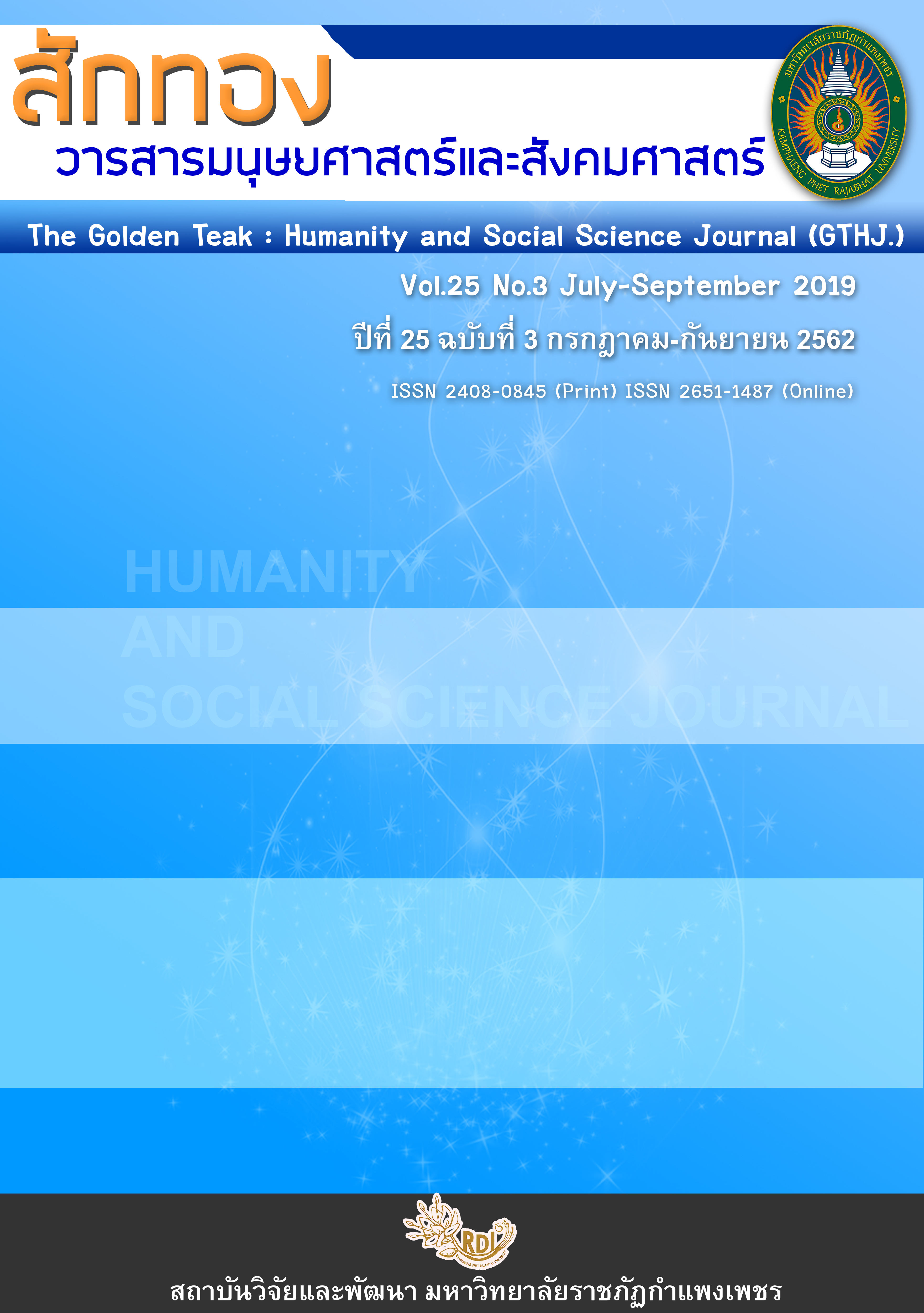โมเดลเชิงสาเหตุของภาวะผู้นำการเปลี่ยนแปลง ความหมายทางจิตวิทยาความสอดคล้องพอดีของบทบาทการทำงาน ผ่านการให้ความหมายงานที่ส่งผลต่อความยึดมั่นผูกพันในงานของครูโรงเรียนเอกชน
Main Article Content
บทคัดย่อ
การวิจัยครั้งนี้มีวัตถุประสงค์เพื่อ 1) ศึกษาภาวะผู้นำการเปลี่ยนแปลง ความหมายทางจิตวิทยา ความสอดคล้องพอดีของบทบาทการทำงาน การให้ความหมายงาน และความยึดมั่นผูกพันในงานของครูโรงเรียนเอกชน และ 2) พัฒนาและตรวจสอบรูปแบบความสัมพันธ์เชิงสาเหตุระหว่างภาวะผู้นำการเปลี่ยนแปลง ความหมายทางจิตวิทยา ความสอดคล้องพอดีของบทบาทการทำงาน ผ่านการให้ความหมายงานที่ส่งผลต่อความยึดมั่นผูกพันในงานของครูดังกล่าว ตัวอย่างสุ่มจากครูที่ทำงานในโรงเรียนเอกชน จำนวน 300 คน ด้วยวิธีการสุ่มแบบหลายขั้นตอน เครื่องมือที่ใช้เป็นแบบสอบถามที่ผู้วิจัยได้พัฒนาขึ้น ได้รับแบบสอบถามคืน 280 ฉบับ คิดเป็นร้อยละ 93.33 สถิติที่ใช้ในการวิเคราะห์ข้อมูลคือการวิเคราะห์สัมประสิทธิ์สหสัมพันธ์ การวิเคราะห์องค์ประกอบเชิงยืนยันและการวิเคราะห์โมเดลสมการโครงสร้างผลการวิจัยพบว่า 1) ภาวะผู้นำการเปลี่ยนแปลง ความหมายทางจิตวิทยา ความสอดคล้องพอดีของบทบาทการทำงาน การให้ความหมายงาน และความยึดมั่นผูกพันในงานอยู่ในระดับมาก และ 2) โมเดลเชิงสาเหตุของภาวะผู้นำการเปลี่ยนแปลง ความหมายทางจิตวิทยา ความสอดคล้องพอดีของบทบาทการทำงาน ผ่านการให้ความหมายงานที่ส่งผลต่อความยึดมั่นผูกพันของครูโรงเรียนเอกชนมีความสอดคล้องกับข้อมูลเชิงประจักษ์ โดยพิจารณาจากค่าไค-สแควร์เท่ากับ 58.15 ค่าความน่าจะเป็นเท่ากับ 0.51 ที่องศาอิสระ เท่ากับ 59 ค่าไค-สแควร์สัมพัทธ์ เท่ากับ 0.99 ค่าดัชนีวัดระดับความสอดคล้อง เท่ากับ 0.97 ค่าดัชนีวัดระดับความสอดคล้องที่ปรับแก้แล้ว เท่ากับ 0.95 ค่าดัชนีรากค่าเฉลี่ยกำลังสองของส่วนเหลือมาตรฐาน เท่ากับ 0.009 และค่ารากของค่าเฉลี่ยกำลังสองของความคลาดเคลื่อนเท่ากับ 0.00
Article Details
บทความที่ได้รับการตีพิมพ์เป็นลิขสิทธิ์ของวารสาร สักทอง : วารสารมนุษยศาสตร์และสังคมศาสตร์ สถาบันวิจัยและพัฒนา มหาวิทยาลับราชภัฏกำแพงเพชร
ข้อคิดเห็นใดๆ ที่ปรากฎในวารสารเป็นวรรณกรรมของผู้เขียนโดยเฉพาะ ซึ่งมหาวิทยาลัยราชภัฏกำแพงเพชรและบรรณาธิการไม่จำเป็นต้องเห็นด้วย
เอกสารอ้างอิง
of Job Retention of Teachers in Schools Under the Surin Educational Service
Area Office 1, Surin Province. Presented in Partial Fulfillment of the Requirements
for the Master of Education degree in Education Research and Statistics at
Srinakharinwirot University.
Avolio, B.J. & Bass, B.M. (2004). Multifactor leadership questionnaire : Third edition manual
and sampler set. Redwood City, CA : Mind Garden.
Bakker, A. B. & Demerouti, E. (2008). Towards a model of work engagement. Career
Development International, 13(2), 209-223.
Britt, T.W. (1999). Engaging the self in the field: Testing the triangle model of responsibility.
Personality and Social Psychology Bulletin, 25, 696-706.
Chang, M.L. (2009). An appraisal perspective of teacher burnout: Examining the emotional
work of teachers. Educational Psychology Review, 21(3), 193-218
Coetzee, M. & Villiers, M.De. (2010). Sources of Job Stress, Work Engagement and Career
Orientations of Employees in a South African Financial Institution. Southern African
Business Review, 14(1), 27-58.
Hair, J.F., et al. (2010). Multivariate data analysis : A global perspective. Upper Saddle River,
NJ : Pearson.
Hamukang’ andu, L. (2013). Meaning of Work And Work Engagement Among Educators In
Choma District, Zambia. Ph. D. (Organization Psychology). Denver : Graduate School
The University of Namibia. Photocopied.
Jacobs, H. (2013). An Examination of Psychological Meaningfulness, Saffty, and Avaliability
as The Underlying Mechanisms Linking Job Features and Personal Characteristics to Work Engagement. Ph. D. (Psychology). Florida International University of Miami at Florida. Photocopied.
Kahn, W.A. (1990). Psychological conditions of personal disengagement at work. Academy of
Management Journal, 33, 692-724.
Kawto, S. (2001). Education News. (Online). Available : http://www.bangkokbiznews.com
[2018, September 10].
May, D.R. (2003). Fostering the human spirit at work : Toward an understanding of the
influences on employees’ experienced meaningfulness at work. Unpublished
script.
May, D.R., Gilson, R.L. & Harter, L.M. (2004). The Psychological Conditions of Meaningfulness,
Safety and Availability and the Engagement of the Human Spirit at Work. Journal of
Occupational and Organizational Psychology, 77(1), 11-37.
Phumirat, C. (2011). Education News. (Online). Available : http://www.thaischool.in.th
[2018, September 10].
Robertson-Smith, Gemma. & Markwick, Carl. (2009). Employee Engagement A Review of
Current Thinking. Brighton: Institute for Employment Studies Mantell Building University of Sussex Campus.
Rosso, B.D., Dekas, K.H. & Wrzesniewski, A. (2010). On the meaning of work: A theoretical
integration and review. Research in Organisational Behavior, 30, 91-127.
Saks, A.M. (2006). Antecedents & consequences of employee engagement. Journal of
Managerial Psychology, 21(7), 600-619.
Schaufeli, W.B., et al. (2002). The measurement of engagement and burnout : A two sample
confirmatory factor analytic approach. Journal of Happiness studies, 3(1), 71-92.
Schaufeli, W.B. & Bakker, A.B. (2004). Job demands, job resources, and their relationship with
burnout and engagement : A multi-sample study. Journal of Organizational Behaviour, 25, 293–315.
Schaufeli, W.B. & Salanova. M. (2008). Enhancing work engagement through the management
of human resources, in Naswall, K., Hellgran, J. and Snerks, M. (Eds.). The Individual in
the changing working life (pp. 380-402). Cambridge: Cambridge University Press.
Schaufeli, W.B. & Bakker, A.B. (2010). Defining and Measuring Work Engagement: Bring Clarity
to the Concept. In Work Engagement: A Handbook of Essential Theory and
Research. Bakker, Arnold B.; & Leiter, Michael. Pp. 10-24. New York: Psychology Press.
Smith, Heather kaye. (2012). Testing Work Characteristics as Mediating Factors in the
Relationships among Nurse Leadership, Burnout, and Engagement. Thesis, M.S.
(Psychology). Knoxville : Graduate School The University of Tennessee at Knoxville.
Photocopied.
Woodcock, Chelsea. (2012). Transformational Leadership and Employee Engagement.
Dissertation, Ph. D. (Psychology). DeKalb: Graduate School The University of Northern Illinois at DeKalb. Photocopied.
Wrzesniewski, A. (2012). Callings. In K.S. Cameron and G. M. Spreitzer (Eds.), The Oxford
handbook of positive organizational scholarship. (pp. 45-55) New York, NY : Oxford University Press.
Wrzesniewski, A., Tosti, J. & Landman, J. (2011). If I could turn back time: Occupational
regret and its consequences for work and life. Working paper.


